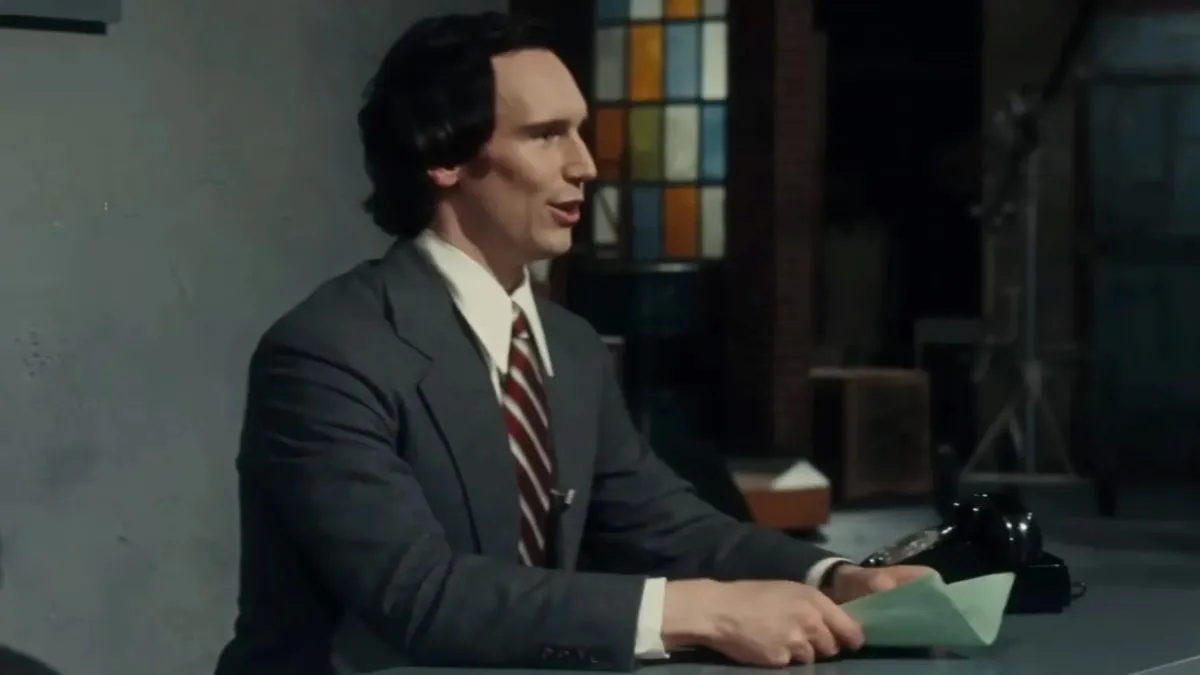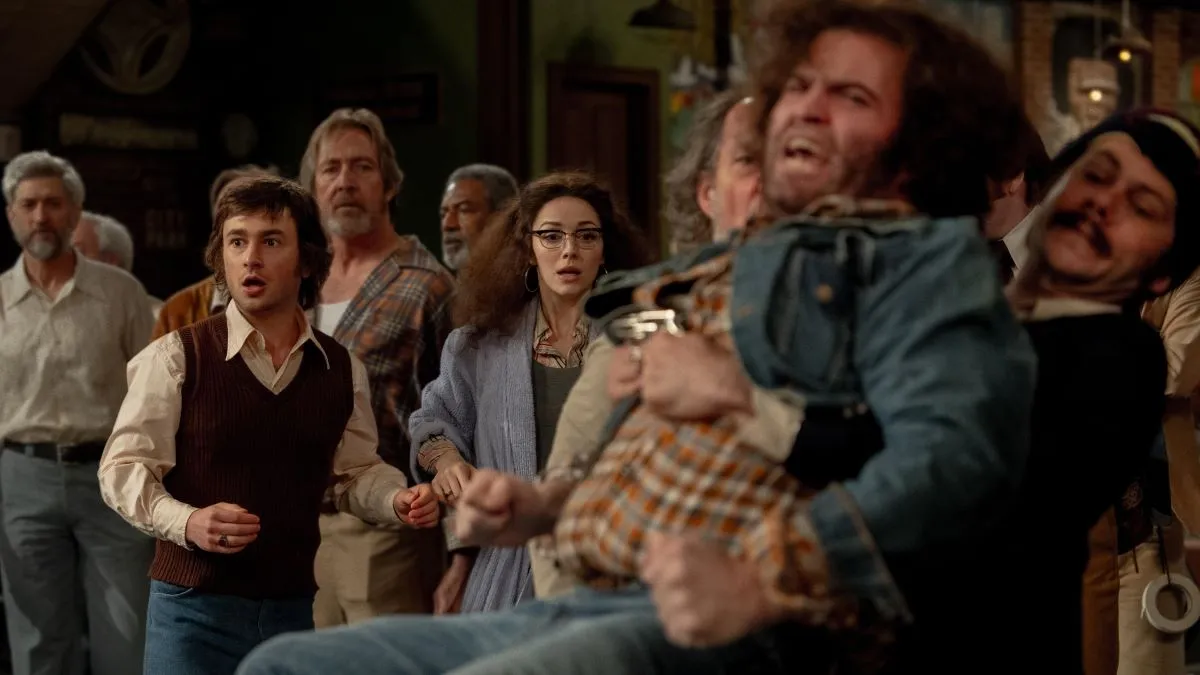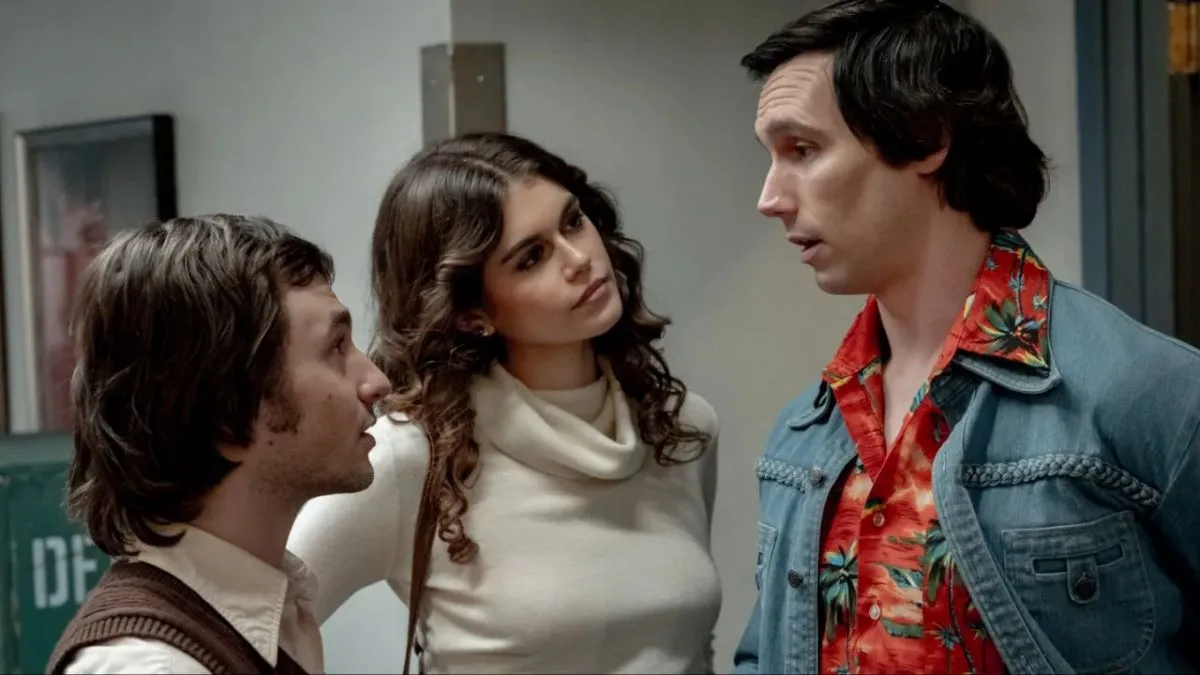October 11, 1975: Canadian creative dynamo Lorne Michaels assembles a posse of players as gifted as they are unknown. He holds in his hands the opportunity to redefine not only the boundaries of broadcast television, but the notion of who could possibly redefine them. Shortly after Lorne lights that match, history — and a generation of stars — is made.
October 11, 2024: Saturday Night is officially released in cinemas across North America, 49 years to the day after the SNL premiere, but history will quite resolutely not be made by Jason Reitman’s dramedy biopic; not as one of the worst viewing experiences in recent memory, and not as one of the best, either. Such is the memory (or lack thereof) that you resign yourself to when you tackle one of the defining origin stories of American culture, and somehow refuse to innovate with even a hint of the boldness that Lorne and company had.
Saturday Night stars Gabriel LaBelle as Lorne, who has exactly 90 minutes to rally his thoroughly restless, biblically disorganized, cocaine-encumbered, ego-stuffed cast and crew for the very first episode of what will soon become Saturday Night Live, lest NBC pre-emptively pull the plug on history’s most prominent sketch comedy program before it ever has a chance to breathe.

One of the many pejorative sentiments that float around the internet about movie trailers is that they practically give away the whole movie. In the case of Saturday Night, this actually does apply, but in a way that’s not pejorative. Indeed, the trailer, as you may recall, is a 137 second panic attack wrapped up in a television studio backdrop.
That trailer was a promise, and Saturday Night delivers. Between the hallway scrambling, rapid-fire exchanges between Lorne and his somewhat-loyal subjects, and a time-is-of-the-essence tension that only spikes and never valleys, the pulse that Saturday Night has its finger on is a very literal one. As a stylistic choice, there’s no denying the effect of relentlessness; together with a syntax machine gun of a script by Reitman and co-writer Gil Kenan, Saturday Night is at its most consistently entertaining when it’s serving exactly what it promised.
Of course, like SNL itself, Saturday Night would have gone nowhere if its players weren’t on point. Luckily, that’s no problem. Dylan O’Brien and Cory Michael Smith — as Dan Aykroyd and Chevy Chase, respectively — carry themselves with the exact imposition and wit that their dialogue demands of them, and LaBelle and Cooper Hoffman (the latter portraying producer Dick Ebersol) are the sweaty, simmering straight-men whose anxiety we have little trouble co-opting. Matt Wood’s John Belushi and Ella Hunt’s Gilda Radner, meanwhile, both gush with ecstatic inspiration.
But it’s Nicholas Braun, by quite some distance, who almost single-handedly embodies the most fascinating facet of Saturday Night. That is, he represents the floor and ceiling, the success and the failures, the pride of the idea and the shame of that idea’s unmet potential, all with his relatively paltry screentime as both Andy Kaufman, and Jim Henson.

We meet Kaufman pretty much right away, and this character sticks in the mind differently than the many other ticking time bombs who populate 30 Rockefeller Plaza. The reason for this is that Braun plays Kaufman as the comedian’s famed Foreign Man character, and together with his passionate-but-defeated-visionary take on Jim Henson, it becomes clear just how severely Saturday Night dropped the ball.
What do I mean? Undeniably, there’s novelty in the chaotic battering ram of Saturday Night‘s approach, but it’s not so much funny or interesting as it is amorphously entertaining. Listening to everyone rattle off their varied dialogue with rhyme-like quickness is akin to watching a firework go off; it happens so fast, you don’t have time to digest the humor in each line. This comedy is rooted in the barrage of verbal spectacle, rather than effective tension and release, and it’s a note with a fixed ceiling on how long it can genuinely play. With Braun’s Kaufman and Henson, by contrast, you actively and consistently wait to hear his dialogue after he’s spoken to, and when he delivers it, its charm is much more pronounced.
There are numerous laugh-out-loud moments, but a majority of them are the recreated sketches from SNL‘s first-ever episode. The cast handles the material well, but the resulting laughs can hardly be attributed to any merit of Saturday Night as a film; at that point, you may as well just go watch SNL. Braun’s recreation of the Mighty Mouse bit is one of these moments.
The largest problem with Saturday Night‘s relentlessness, however, is that there simply isn’t much in the way of carbs to pair with the sugary pacing. The comedy mostly looks and sounds funny rather than actually being funny, and the drama isn’t nearly lived-in enough for us to latch onto it. But then, how do you even add depth to a biopic about SNL as an entity? A program that’s defined by its lack of structure and, arguably, by its lack of purpose?

Well, why is it we latch onto SNL? It’s funny because we know the people involved with the sketches. We don’t see the characters in the sketch; we see the actors. And so the humor comes not only in the new weekly material, but in the way these actors and comedians craft and approach their characters, while still being themselves.
My questions, then, are as follows: why was Nicholas Braun the only actor who played two different characters, or who stayed in character-within-a-character as Foreign Man/Andy Kaufman? For that matter, why didn’t he and the rest of Saturday Night’s main cast triple- or even quadruple-up on characters?
Look at who Saturday Night was working with: Gabriel LaBelle, Rachel Sennott, Ella Hunt, Dylan O’Brien, Cooper Hoffman, Andrew Barth Feldman. These youngsters are every bit the next generation of talent that the original SNL cast was back in 1975; why not honor that decades-old revolution by going a similar technical distance in Saturday Night? It shouldn’t just be us chuckling at how Dylan O’Brien handles Dan Aykroyd as a character; it should be us enjoying the many, separate comedic shades that O’Brien employs when approaching Aykroyd, and then a different character, and then a different character. All of a sudden, every time O’Brien is on screen as a new character, we anticipate how he’s going to approach this new character the way we anticipate Braun’s next line as Andy Kaufman, and we subsequently appreciate O’Brien’s performance the way we appreciate an SNL sketch.
Better yet, how could this approach have manifested in Saturday Night‘s dramatic scenes? SNL may have turned us on to its actors handling a variety of comedy beats as different characters, but it of course never did the same thing with dramatic beats, let alone a mix of both. Saturday Night teased with that opportunity, and that was the ground that the film needed to break in order to well and truly honor the true story that it’s based on.
But it didn’t. A Nicholas Braun-shaped stroke of genius was staring it (and us) right in the face, and Saturday Night decided to settle for fast-paced, psychological schadenfreude instead. For that, it’s ultimately a film that sparks dense ambivalence upon the roll of the credits, and seeing as dense ambivalence is an attitude you can find most anywhere in America, one can only give this version so much credit.











Published: Oct 11, 2024 12:24 am